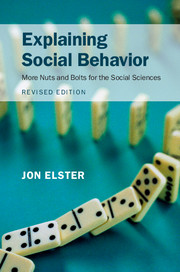Book contents
- Frontmatter
- Dedication
- Contents
- Preface
- I Explanation and Mechanisms
- II The Mind
- III Action
- IV Interaction
- 17 Unintended consequences
- 18 Strategic interaction
- 19 Games and behavior
- 20 Trust
- 21 Social norms
- 22 Collective belief formation
- 23 Collective action
- 24 Collective decision making
- 25 Institutions and constitutions
- Conclusion: is social science possible?
- Index
24 - Collective decision making
from IV - Interaction
Published online by Cambridge University Press: 05 August 2015
- Frontmatter
- Dedication
- Contents
- Preface
- I Explanation and Mechanisms
- II The Mind
- III Action
- IV Interaction
- 17 Unintended consequences
- 18 Strategic interaction
- 19 Games and behavior
- 20 Trust
- 21 Social norms
- 22 Collective belief formation
- 23 Collective action
- 24 Collective decision making
- 25 Institutions and constitutions
- Conclusion: is social science possible?
- Index
Summary
Often, members of a group – from the family to society as a whole – need to regulate matters of common concern by making decisions that are binding on them all. Consider again the question of regulating water consumption during periods of scarcity (Chapter 5). Sometimes, this collective action problem may be resolved by decentralized decisions, through a combination of moral, quasi-moral, and social norms. Often, however, the city council has to limit the water supply or reduce consumption by banning certain uses, such as watering the lawn or filling up swimming pools. When collective action fails, collective decision making may be required.
For another example, take the practice of voting in national elections. As explained in the previous chapter, the choice whether to vote or stay home is a classic collective action problem. Knowing that his or her voice makes virtually no difference to the outcome, each citizen has a personal interest that dictates abstention. Yet if everybody abstained, or if voting dropped to very low levels, democracy itself might be in danger of being replaced by a dictatorship or an oligarchy, against (almost) everybody's interest. In many democracies voting does in fact reach respectable levels, from 50 percent to 80 percent, as a result of decentralized decisions by the citizens. Some may ask themselves, “But what if everybody abstained?” Others may say to themselves, “Since most others bother to vote, it is only fair that I should do so too.” Still others may calculate that “although the impact of my vote on the viability of democracy is tiny, it is important if multiplied by the large number of other citizens it affects.” In a small village, some may fear that “if I stay home, my neighbors will notice and express their disapproval.”
- Type
- Chapter
- Information
- Explaining Social BehaviorMore Nuts and Bolts for the Social Sciences, pp. 399 - 428Publisher: Cambridge University PressPrint publication year: 2015

